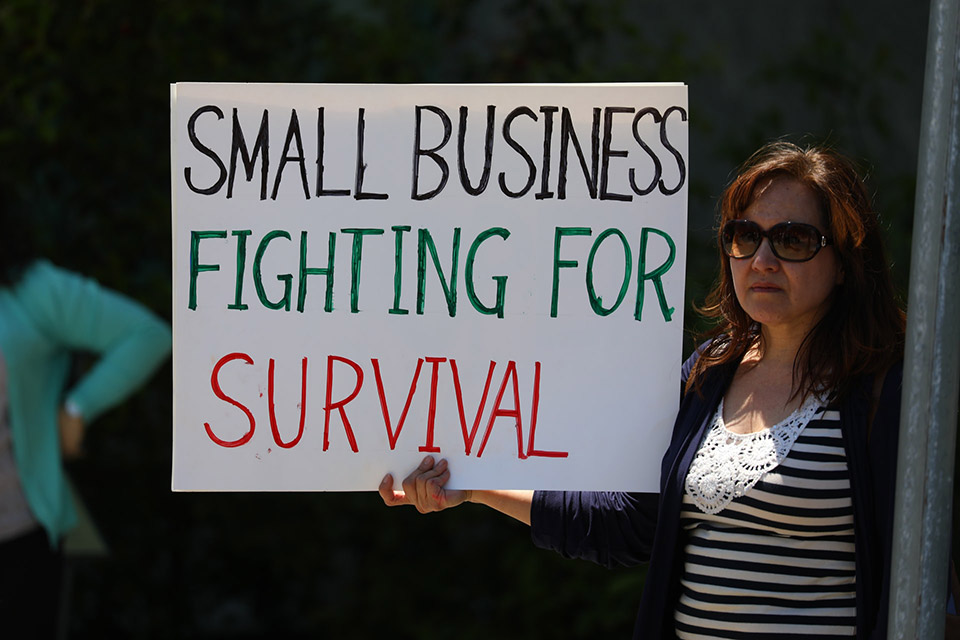Sadly, the pandemic has had disproportionately adverse effects on small businesses. According to a study conducted by the Proceedings of the National Academy of Sciences of the United States of America (PNAS), the pandemic had already caused massive dislocation among small businesses just weeks after its onset. Across the 5,800 small businesses surveyed, 43% of businesses had temporarily closed, and nearly all of these closures were due to COVID-19, reductions in demand and employee health concerns. On average, the businesses reported having reduced their active employment by 39% since January. These trends are devastating.
As consumers, our job is simple: support more small businesses.

Small businesses are businesses, partnerships, or independent ownerships that typically have less revenue and employees than a larger company or corporation and/or fewer assets. The actual term “small business” is protected by the Small Business Association (SBA). According to the SBA, depending on your industry, a small business could be defined as a business with a maximum of 250 employees or a maximum of 1,500 employees. This size and scale is shocking to many – most imagine a small business as less than 100 employees, but the SBA actually includes businesses much larger than that. Overall, they’re privately owned corporations, partnerships, or sole proprietorships that have less revenue than larger businesses.
What are some easy ways to help? First of all, rethink your everyday spending habits: can you transfer any of that spending to small and local businesses? While some transactions are extremely difficult to transfer to the small business landscape, such as insurance, try to rethink your other purchases. Although they may be smaller purchases, they add up. Where do you buy your gas? Your coffee? Your groceries? Your clothes? Whom do you employ to do your accounting? Your landscaping? These are all sectors that generally have more options in the small business realm. If we don’t want the economy to be even more monopolistic than it already is, it is up to consumers to put our money where our mouths are.
Conversely, small business owners must be prepared to take risks. Your business expenses, especially post-COVID-19, may have trended to being higher than your current business income. For example, there may not be enough money to pay all the necessary operating expenses, such as insurance, taxes, labor wages, equipment rental and maintenance, business licenses, and other associated expenses. As a result, you may be forced to take on extra financing. SBA small business loans may be a good resource for your business.
To be successful, your small business must grow. Even if your business starts out with low overhead and little or no investment, it is important to keep building your business through marketing, sales, and expansion. While many people believe that all their efforts are wasted if they are unable to turn a profit, a successful business will continue to grow through marketing and growth. It is important to realize that the only way to have a profitable small business is to make sure that you keep expanding and growing as your business grows.
In order to build your small business, you will first need to choose a niche and a specific product or service to sell. To rebuild a failing small business, oftentimes, a pivot is necessary. Take a step back and analyze what needs you are serving, and if those are objectively necessary. You must offer a unique product or service that others do not offer in your area or you may choose to specialize in a specific industry. Ensure you are doing something to set yourself apart. Examples of pivots during COVID-19 include co-working spaces that created virtual meeting spaces, and fashion designers who started designing face masks.

Secondly, marketing is an essential component of growth. There are many types of marketing strategies that can be used to market your business. In normal times, the most effective strategy is word-of-mouth advertising. Word-of-mouth advertising may be as simple as reaching potential customers by distributing fliers or having signs at local events where people will be interested in your business. Encouraging your customers to reach out to their communities also helps to expand your business and may include recommendations your customers leave you on Yelp, Google, or even on LinkedIn.
That said, business can rarely function entirely dependently on word of mouth advertising. Consider hiring a publicist to help get the word out. Though that may seem like a massive financial commitment, there are small Public Relations companies out there that consider smaller accounts and temporary projects. Do your research to see what’s out there. Contemplate also using social media to help market your business. This is a cost-effective tool becoming more and more expected and necessary as time goes on. According to MarketingProfs, 57% of publicists state that their clients’ businesses have pivoted their PR strategies since COVID-19, and while many larger PR agencies have experienced losses, many small PR firms are accepting small business clients at competitive rates.
No matter if you are a small business owner or a consumer, supporting small businesses is important and appreciated.



buy augmentin 875 125 Complex height was not measured in this study for this reason